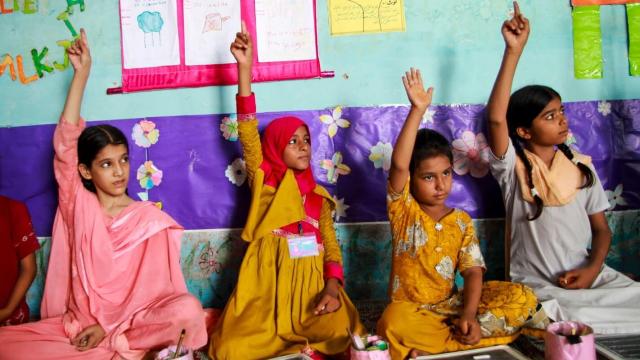As many of you know, the Global Education Monitoring Report (GEMR) is THE big annual report in international education, submitted by a UNESCO-housed but editorially-independent team. Every year, the GEMR combines an annual update on progress against global education goals with a deeper-dive thematic focus. The 2021 report will have a thematic focus on non-state actors, and is therefore of high importance to GSF and to our members. The GEMR is well respected for its independent assessment of the evidence and plays an influential normative role in making recommendations for education policy and financing.
GEMR’s stated intent with the 2021 report is to “broaden the conversation” on non-state actors. We have been talking to the GEMR Team through the second-half of 2019 to understand how GSF can best contribute for the 2021 report. The GEMR Director also participated in our GSF Member session at the UKFIET conference in September last year.
We encourage you to get involved in the GEMR consultation process in the following 4 ways:
We encourage you to get involved in the GEMR consultation process in the following 4 ways:
- We welcome your feedback on GSF’s response to the GEMR Concept Note. A first draft of a GSF response is attached. We welcome your feedback on the response by Thursday 23rd January.
- We encourage you to write your own response to the Concept Note or engage with the online consultation– the more inputs they receive the better! The consultation will close on 24th January.
- We encourage you to write an Expression of Interest for a Research Grant from GEMR. You need to send an expression of interest of 300 words describing the importance, scope, methodology, research and evidence that your contribution would provide. The deadline for contributions is 24th January.
- We invite you to the GEMR consultation scheduled during our Spotlight on: Talent, South Africa convening in February, where members of the GEMR team will discuss the report with GSF members. This is an opportunity to interact face-to-face with the GEMR; we’re particularly pleased that they have agreed to attend our meeting.
Consultation and call for contributions for the 2021 GEM Report on non-state actors in education

Join the consultation on the 2021 GEM Report on non-state actors in education
Few topics in education generate as much passion as the role of non-state actors. While everyone wants to achieve the goal of providing quality education for all, who delivers it, who is engaged, and how they are engaged is a subject of much debate. Non-state activity in education has a variety of motivations, from charity to profit. Activities may or may not involve collaboration with the government, debate abounds as to whether the role of non-state actors should be encouraged or contained. Public opinion on non-state actors displays generational shifts that vary between countries.
Earlier this week we released the concept note and opened the online consultation on the 2021 Global Education Monitoring Report on non-state actors in education, which will monitor the situation, inform and advance research, and provide policy recommendations.
The 2021 GEM Report is an opportunity for providing evidence-based research that can provide clarity on the role of non-state actors in achieving progress towards SDG 4.
As with every year, via our consultation we would like to invite you to:
- Provide substantive feedback to the proposed lines of research
- Recommend interesting examples from around the world that illustrate the different roles non-state actors play in in different education systems
- Recommend potential areas of new research drawing on already established or previously unexplored sources of quantitative and qualitative data.

Contribute your research
For the first time we are also opening a call for expressions of interest to contribute to the Report with research. You may submit an expression of interest for a paper in 10 areas identified by the Report team and also to make your own suggestion. To take part, please follow our guidelines and send us an abstract of no longer than 300 words describing the importance, scope, methodology, research and evidence that your contribution would provide. The deadline for the contributions is 24 January. Successful applicants will be notified by 14 February 2020.

